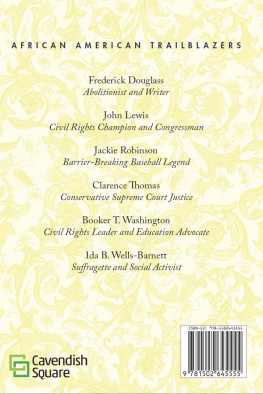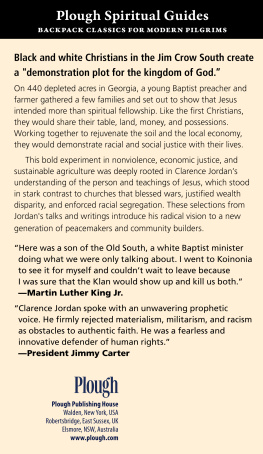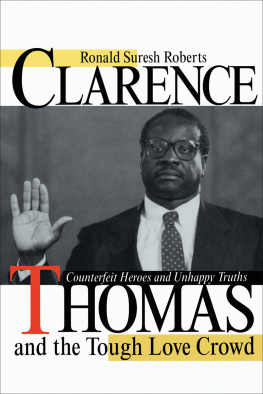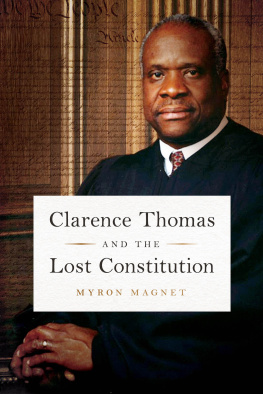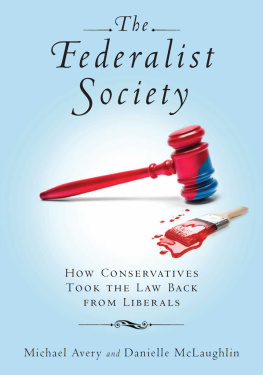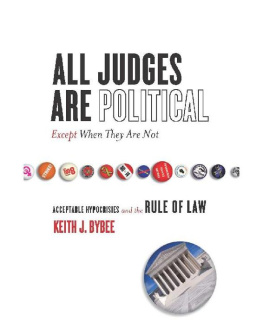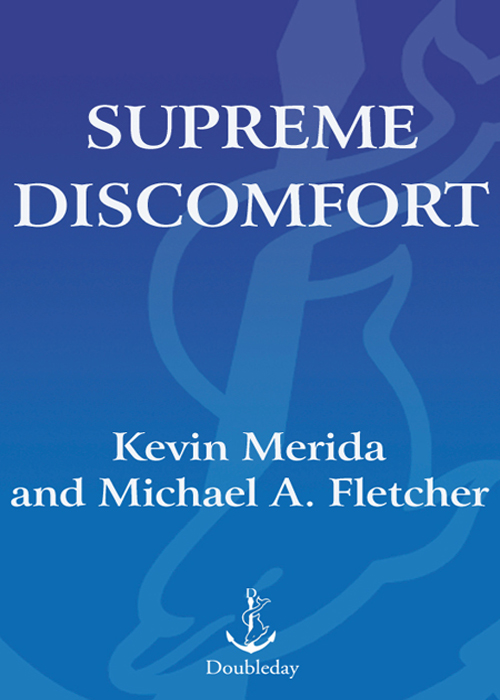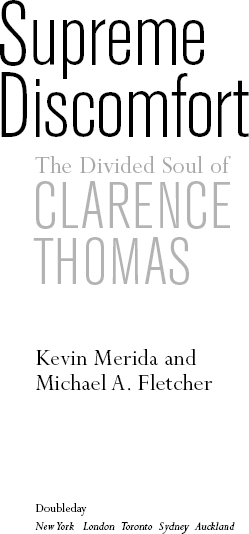
PROLOGUE
I t was 8 a.m. when the phone rang in his Westin Hotel room. Done with breakfast, Associate Supreme Court Justice Clarence Thomas still had an entire morning to spend before his luncheon speech to the Savannah Bar Association. Lester Johnson was on the line.
Whatre you doing? Johnson asked.
Im just coolin out, Thomas replied.
Johnson, an old friend and prominent local attorney, figured Thomas would enjoy a quick tour of the renovated Bull Street Library, the main branch in Savannahs Victorian district, which wouldnt admit blacks until 1963. When Thomas was growing up here, he spent most of his free time in the Carnegie Library, on the black side of town. It wasnt until he was a teenager that integration gave him access to the Big Library, as he called it, but once access was granted Thomas became a Bull Street regular.
Thomas notified his security detail and met Johnson in front of the library. Not wanting to monopolize Thomass time, Johnson had promised the tour would take just fifteen minutes. But once Thomas planted himself among the historical texts and old city maps, once he started reminiscing about story hour, once he started introducing himself to the genealogy specialist and the security guard and posing for photos, it was hard to drag him away. He stayed for two whole hours.
He spotted a group of black fourth and fifth graders from a private academy and, hoping to inspire them, sidled over. This was vintage Thomas, always drawn to the children in a room. When he was a kid, Thomas told them, the library was how he expanded his world, using books to visit places that were beyond his reach. The kids, however, were having too much fun on the computers to pay close attention to this VIP they didnt recognize. Johnson seemed more bothered than Thomas by the lack of recognition. He had a library staffer make twelve copies of Thomass bio and instructed the students to tell their parents whom they had metnot only the sole African American on the nations highest court but arguably Savannahs most famous son.
Johnson, a soft-spoken man of slight build, had long admired Thomas, who is five years his senior. Both came up through the Catholic school system in Savannah during Jim Crows reign. Thomas, in fact, spent little time in public education, snatched out by his grandfather, who figured hed get superior, more disciplined instruction from the Franciscan nuns and perhaps one day become the citys first black priest. Thomas and Johnson both ended up at College of the Holy Cross in Massachusetts, though not at the same time, and pursued legal careers. While at Yale Law School, Thomas became something of a mentor to Johnson, imploring him to avoid easy courses as an undergrad and prepare for lifes later competitions. (Let them white boys go out and get drunk, he told Johnson. You need to be staying on campus and hitting those books.)
Upstairs, the Bull Street Library tour continued. Thomas and a childhood acquaintance, W. John Mitchell, were giddily recalling youthful pastimes such as pluffer, a game that involved shooting chinaberries at each other through a tube of cane. But the good cheer was interrupted when Abigail Jordan, a retired educator and local black activist who just happened to be in the library, spotted Thomas.
There was something in the spectacle of the burly justice, with his booming laugh and broad grin, yukking it up with his friends that compelled Jordan to move toward the group, close enough, as she would later say, to be kissed by Lester Johnson. She stood before them, glared, and abruptly said, I just wanted to see what a group of Uncle Toms look like. Then she walked away.
To some people, just being in the company of Clarence Thomas is enough to damn you.
That episode occurred on May 11, 2001. To us, as chroniclers of Thomass life, the tale remains vivid. It represents an awkward convergence of what both inspires and haunts him most.
Uncle Tom is the most searing insult a black American can hurl at a member of his or her own race, a synonym for sellout, for someone subservient to whites at the expense of his own people. No black man wants that label. That the lone African American on the Supreme Court would provoke such a cutting slur should be astoundingand yet it has become part of mainstream discussion.
But not among children. No child would call Clarence Thomas an Uncle Tom. In children, Thomas sees uncluttered minds, fresh possibilities, hopethe hope that maybe they wont prejudge him, wont view him through the lens of their elders, some of whom he believes are stuck on old ideas. Maybe they will grow up to become independent thinkers, which is how Thomas sees himself. So hes never too busy for the kids. Sometimes hell spy a touring school group at the court and invite the students up to his chambers. For Thomas, being a kid at the library, alone with his books, is among his happiest memories.
But then theres always the prospect of an Abigail Jordan appearing out of nowhere, if not literally then metaphorically. While it may be unusual for a Supreme Court justice to be publicly confronted in such a provocative wayThomass wife, Ginni, says her husband rarely encounters anything but polite receptionsthe antipathy toward Thomas among African Americans is wide and deep and persistent. It surfaces at corporate water coolers, in beauty shops, gymnasiums, faculty dining roomswherever blacks congregate and Thurgood Marshalls successor happens to be mentioned.
This book grew out of such an occasion. We were attending a party of black professionals some years ago when Thomass name was harmlessly invoked. The conversation started small and quiet, but soon people overhearing it came from the other side of the room to participate. Almost instantly, a roaring, improvisational debate was taking place. Did Thomas deserve the harsh judgments? How is it decided who qualifies for black legitimacy? As we saw it, no other public figure in American life had the ability to spark such intense passions among blacksif not seething anger, then the restless need to analyze him, to come up with some piece of sideline sociology to explain the vast gulf between arguably the most powerful African American in the land and so many members of his own race.
A 1998 poll conducted by the Joint Center for Political and Economic Studies, which specializes in research on African Americans, showed Thomas had a favorable rating of just 32 percent among blacks. These are the worst numbers of any prominent black figure Ive ever asked about, said David Bositis, the centers longtime political analyst. That roster would include Condoleezza Rice and Jesse Jackson, Colin Powell and Al Sharpton.
On August 4, 2002, the Washington Post Magazine published a cover story by us, The Lonely Stand of Clarence Thomas. It was our first crack at exploring both the racial vehemence that has hounded Thomas and the roots of his ascension to the judicial mountaintop. This book is the product of a more far-reaching journalistic mission to understand and explain Thomas. We were guided by a simple notionthat all lives are complex, that there is no singular, overriding truth about any of us. Which is the most authentic portrait: The magnetic Clarence Thomas who strikes up friendships in RV parks as he drives his forty-foot motor coach around the country? The ideological Clarence Thomas who is a hero of the conservative right and officiated at Rush Limbaughs wedding? Or the despised Clarence Thomas, the mere sight of whom kindles an epithet in the hush of a public library?


